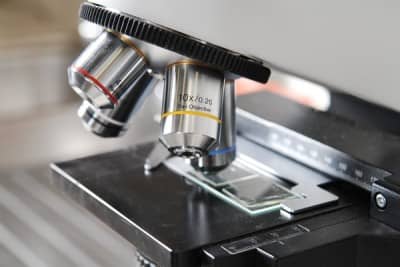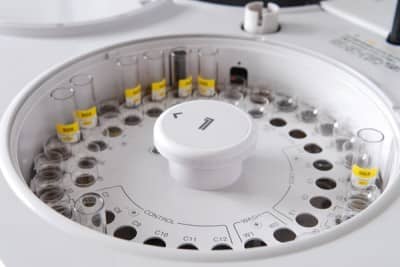In the Biochemistry Laboratory of NPISTANBUL Hospital, the tests requested by clinical physicians are carried out with great care and within internationally accepted methods and acceptable error limits. Within the framework of this understanding, our laboratory services for diagnosis, follow-up, risk and prognosis determination are carried out in a patient-oriented manner with teamwork.
OUR QUALITY CONTROL POLICY
Internal and external quality control applications are absolutely necessary to obtain accurate and reliable results in clinical laboratories. In our laboratory, internal quality control is performed for each parameter every day to test the reproducibility and reliability of the results. In addition, we continue to be a member of the CAP (College of American Pathologists) and RIQAS external quality control programs, which are the most widely participated programs in the world, to objectively evaluate the accuracy of the test results. With these external quality control programs, our test results are compared with many laboratories around the world every month.
In addition, our institution is periodically audited by the Joint Commission International (JCI) and ISO 9001:2008 Quality Management System, which are independent accreditation bodies recognized as authorities in the world, and our accreditation studies on this subject continue uninterruptedly.
OUR TEST PANELS
In our Biochemistry Laboratory, many routine and specific tests are performed with special kits and autocalyzers.
The test groups studied in our laboratory are as follows:
- Biochemistry and Electrolyte
- Hormone - Serology
- Tumor markers
- Neuroinflammatory panel
- Hematology
- Coagulation
- Urine and stool analysis
- Toxicology analysis
- Drug levels
BIOCHEMISTRY - ELECTROLYTE
- Fasting blood glucose
- Postprandial blood glucose
- Glucose tolerance tests
- ALT
- GGT
- LDH
- Total cholesterol
- Triglyceride
- HDL - Cholesterol
- LDL - Cholesterol
- Cholinesterase
- Creatine kinase (CK)
- CK-MB
- Uric Acid
- Calcium
- Magnesium
- CRP (C-reactive protein)
- Hs- CRP
- ASO
- RF (Rheumatoid factor)
- Total Protein
- Albumin
- Hemoglobin A1c
- Iron
- Iron binding capacity
- Total Bilirubin
- Direct Bilirubin
- Sodium
- Potassium
- Chlorine
- Lithium
HORMONE - SEROLOGY
- TSH
- Free T4
- Free T3
- Prolactin
- HCG
- Insulin
- HOMA-IR
- Cortisol
- ACTH
- Troponin I
- HBsAg
- Anti Hbs
- Anti HIV
- Anti HCV
- Parathormone
- Vitamin B12
- Folic Acid
- Ferritin
- BNP
- Procalcitonin
- Homocysteine
- Estradiol
- FSH
- LH
- Progesterone
- Testosterone
TUMOR MARKERS
- AFP
- CA 125
- CA 15-3
- CA 19-9
- CEA
- Total PSA
- Free PSA
- AFP
NEUROINFLAMMATORY PANEL
- Anti NMDA Antibody
- Anti AMPA Antibody
- ENA Profile
- Anti Nuclear Antibody
HEMATOLOGY
- Complete blood count
- Sedimentation
COAGULATION
- PT
- APTT
- Fibrinogen
- D-Dimer
URINE AND STOOL ANALYSIS
- Routine urinalysis
- 24-hour urine analysis (creatinine clearance, total protein)
- Stool microscopy
- Stool examination for parasites
- Fecal occult blood
TOXICOLOGY ANALYSES
- Emergency toxicology testing
DRUG LEVELS
- TDM (drug blood level measurement)
PHARMACOGENETICS DRUG PANEL GENETIC TESTING
In the treatment of psychiatric disorders, pharmacogenetic tests are very useful both in choosing the treatment for the patient and in minimizing side effects. Pharmacogenetic tests allow us to optimize, i.e. individualize, the treatment for each patient in the light of genetic information. Once the patient has been diagnosed, pharmacogenetic testing allows us to start the most ideal treatment based on scientific facts, not groping. With personalized, individualized treatment approaches, it is possible to apply the most effective, most appropriate dose and least side effect treatments to the patient.
Genetic differences between individuals are very effective on the enzymes that allow drugs to be metabolized and excreted from the body. Cytochrome P450 enzymes are the most important enzymes that metabolize drugs used in psychiatry, cardiology and pain management. Cytochrome enzymes are found in the liver.
The pharmacogenetic drug panel test provides a genetic profile by identifying variations in genes that regulate cytochrome enzymes. As a result of this test, individuals are given a Pharmacogenetic Profile Identity Card, a first in Turkey .
LICENSED AMATEM LABORATORY
Our Biochemistry Laboratory is also licensed as an AMATEM laboratory. Urine toxicology tests are performed in addiction patients and various risk groups to determine whether the person is using addictive substances. Before all these tests, samples are taken under supervision and all processes are recorded.
Our laboratory is very meticulous during sample collection and vacuum and sterile tubes are used for blood sampling. Sample acceptance and rejection criteria have been determined and samples are made ready for study in accordance with these procedures. In addition, identity verification with name and photograph is performed. Endogenous and exogenous factors that have various effects on test results are taken into consideration and cooperation with physicians is sought. Results are given with reference ranges prepared according to age and gender.
THE ROLE OF THE LABORATORY IN THE DIAGNOSIS AND FOLLOW-UP OF METABOLIC SYNDROME
Metabolic syndrome is an important health problem that can be caused by long-term use of antipsychotic drugs. For this reason, fasting blood glucose, postprandial blood glucose, oral glucose tolerance tests, HbA1c, insulin, HOMA-IR, blood lipid levels tests, which are important in the diagnosis of metabolic syndrome and insulin resistance, can be performed in the biochemistry laboratory of our hospital. By performing these tests, our patients are diagnosed and monitored in terms of metabolic syndrome.
ANALYTICAL PERFORMANCE CRITERIA
Our aim as Biochemistry Laboratory;
- Requesting the right test
- Taking the right sample
- Studying the right test
- Delivering the correct result to the physician and the patient.
In line with this goal, all preanalytical, analytical and postanalytical factors that may affect the analytical performance and accuracy of the tests are meticulously examined and analyzed and the results are approved by our biochemistry specialist doctor. Samples with completed and approved results are stored under appropriate conditions for a long period of time, enabling the physician to add new tests or compare the results with new samples.
Information about the tests studied, especially how to take samples related to the tests, procedures for collecting special samples such as urine and body fluids, their storage, transportation to the laboratory and related materials are provided from the laboratory.
As NPISTANBUL Hospital Biochemistry Laboratory, our goal is to expand our test panel in the light of technological and scientific developments and to increase our service quality with our trained and qualified staff.


